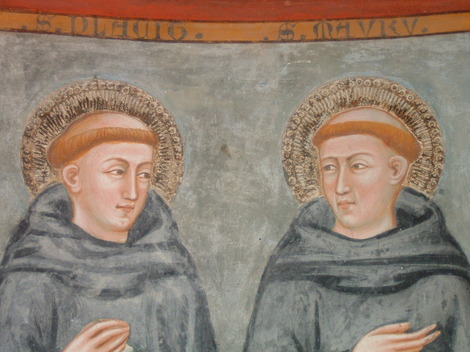Chapter II: The Example of Deeds
Chapter II. What Kind of Man the Abbot Ought to Be
11 Jan. 12 May. 11 Sept.
Therefore, when anyone receiveth the name of Abbot, he ought to govern his disciples by a two-fold teaching: that is, he should shew forth all goodness and holiness by his deeds rather than his words: declaring to the intelligent among his disciples the commandments of the Lord by words: but to the hard-hearted and the simple minded setting forth the divine precepts by the example of his deeds. And let him shew by his own actions that those things ought not to be done which he has taught his disciples to be against the law of God; lest, while preaching to others, he should himself become a castaway, and God should say to him in his sin: “Why dost thou declare My justice, and take My covenant in thy mouth? Thou hast hated discipline, and hast cast My words behind thee.” And again: “Thou who sawest the mote in thy brother’s eye, didst thou not see the beam in thine own?”
Deeds More than Words
Saint Benedict would have the abbot radiate goodness and holiness, not by much speaking, but by the way he lives in the humble circumstances of ordinary daily life. Deeds are more easily understood than discourses. By a consistent goodness of life, an abbot can break through the crusty resistance of men not easily impressed by fine words, or even hardened by them. Too great a reliance on preaching and teaching to communicate the flame of monastic life can have the opposite effect. It can induce a certain weariness of words, and cause monks to become passive, or disheartened, or simply fed up.
If an abbot would have his monks be punctual to the choir and refectory, he must consistently demonstrate that such punctuality is, in fact, an expression of charity, of gratitude, and of respect for others. If he would have his monks do cheerfully their share of the humble household tasks, he must show by his deeds that such tasks are an important and valued contribution to life together. If an abbot would have his monks become lovers of silence and of the enclosure, he must be the first to observe silence and enclosure. If an abbot would have his monks be quick to forgive and slow to anger, he must model ready forgiveness and patience at every opportunity. If an abbot would have his monks be assiduous in lectio divina and generous in pure, unprogrammed times of prayer, he must set the example by his personal discipline and willingness to “lose time” in prayer. It has often been observed that a community takes on, over time, the demeanour and distinctive traits of its abbot.
Compunction
Lest an abbot be blinded by the beam in his eye, he must wash out his eyes frequently with tears of sorrow for his past sins, and treasure the incomparable grace of compunction. So long as a man lives, even with the grace of monastic consecration, he remains capable of spiritual blindness. Nothing so restores the clarity of one’s inward sight as do tears of compunction, and these cannot be forced or otherwise produced. They are a gift of God.

